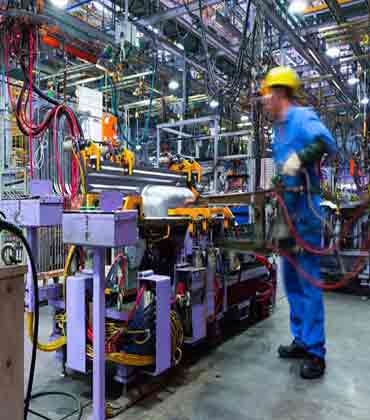Thank you for Subscribing to Chemical Industry Review Weekly Brief
Chemical Industry Review: Specials Magazine
Chemistry is the fundamental building block of every innovation. From enhancing the vibrancy of paint colors to helping the world turn technology into wearable fashion accessories, it brings inspired ideas to life. Celanese Corporation (NYSE: CE) is a global chemical and specialty materials leader renowned for harnessing chemical innovation's power to solve complex industrial challenges and improve everyday life. It manufactures high performance engineered materials and acetyl based chemicals that fuel essential operations across numerous industries worldwide. Customer centricity and sustainability are the foundational pillars of its expansive product portfolio, spanning advanced polymers, food ingredients and chemical intermediates. "At Celanese, we are passionate about innovation, and it is at the core of our mission to meet the diverse requirements of global manufacturers,” said Pedro Van Hoecke, vice president technology and innovation - global engineering materials leader. The First-Choice Chemistry Solution Source A robust foundation in science and technology powers Celanese to advance global chemical manufacturing at an unmatched pace. Its engineered materials division delivers performance-enhancing polymers for automotive, electronics and medical device applications. These offerings provide greater flexibility to manufacturers and guarantee superior durability and thermal resistance—traits that meet the rigorous demands of modern engineering. Through cutting-edge thermoplastic composites, Celanese facilitates lightweighting in automobiles without compromising their structural integrity. In the electronics sector, the company provides specialized materials that demonstrate superior heat resistance and allow precision molding, thereby improving component performance and reliability. Supporting key applications and meeting the requirements of medical device designers and manufacturers has been a hallmark of Celanese’s operations for over four decades. Its advanced medical polymers provide specialized benefits to help meet manufacturers’ miniaturization targets, guarantee high strength, minimize wear and friction and enhance user comfort and aesthetics. Industries rely on Celanese for materials that streamline manufacturing while enhancing product longevity. The company’s broad portfolio also includes advanced polymer solutions for industrial applications, where strength, chemical resistance and processing efficiency are paramount. A Force to Reckon in the Acetyls Market Celanese’s acetyl products are the building blocks for countless industrial and consumer goods. It produces acetic acid, vinyl acetate monomer and derivatives powering various applications, from paints and coatings to adhesives and textiles. The company’s global production network includes some of the world’s largest and most advanced acetic acid facilities.
Biofine Technology’s approach to its business is anything but traditional. The company does not see itself as simply having a single customer base; rather, it views its stakeholders as a network of interconnected partners. On one hand, it sells innovative products like clean-burning fuels, environmentally friendly deicers and carbon sequestration solutions. On the other, it creates a market for raw materials— such as waste wood and other byproducts—generated by industries like forestry and waste management, industries that previously had no outlet for these materials. Founded by Dr. Stephen W. Fitzpatrick, Biofine Technology has over 25 years of development behind its technology, which is recognized as one of the most efficient methods for converting lignocellulose into high-value bioproducts. The process begins with waste wood, which is refined into various products using a chemical hydrolysis technique. This process involves dilute sulfuric acid mixed with wood feed, heated to moderate temperatures. Within about 30 minutes, this reaction produces levulinic acid (LA) alongside formic acid and carbonaceous residue. Levulinic acid is further processed with ethanol to produce clean fuel, while the carbon residue undergoes pyrolysis to create biochar. This highly stable form of carbon can sequester carbon for up to a thousand years, making it a valuable soil amender and a key player in carbon credit markets. “We are commercializing our technology to address the growing demand from customers. With strong market interest and a clear need for our products, we are confident in significant demand and success potential,” says Stephen Rigal Jones, CEO of Biofine Technology. Biofine Technology’s clean fuel, in this regard, has been verified as a direct replacement for traditional heating oil, a fossil fuel and major source of atmospheric pollutants. This product is poised to disrupt the heating oil industry, attracting significant interest and securing large-scale commitments for the first 15 years of production.
Top Specialty Chemicals Company 2025
Element Solutions (NYSE: ESI) leads the way in specialty chemical innovations, enhancing the performance of everyday products across diverse industries, including consumer electronics, automotive systems, and telecommunications. By prioritizing innovation, the company helps manufacturers remain competitive in an evolving global market. With a customer-centric approach, Element Solutions operates 63 manufacturing and research and development (R&D) sites in 18 countries, ensuring seamless service and strong market relationships. In the automotive sector, it supports the demand for advanced in-car technology with specialty materials, while in telecommunications it delivers technologies that enhance global connectivity and next-generation energy solutions. In high-stakes industries like military, aerospace and healthcare, Element Solutions provides highly reliable materials supported by comprehensive global quality management systems. For instance, by prioritizing passenger safety, the company offers durable coatings that improve wear resistance in aerospace components, including shock absorbers for landing gear. Similarly, in the water treatment sector, the company’s products are designed to improve the performance and efficiency of heating systems and remove pollutants from the system water. These offerings drive the company to shape the future of several industries, ensuring that every connection, display and function is optimized for users around the globe. Within the electronics division of the company’s business, it ensures that specialty chemicals are researched, formulated and delivered for all types of electronic hardware. From the intricate designs of printed circuit boards (PCBs) to advanced interconnect materials used in everyday consumer devices, Element Solutions plays a pivotal role in shaping the electronics manufacturing industry. “With proven expertise in wet chemical processing and materials for electronics assembly, we are dedicated to delivering tailored, application-specific solutions that meet the unique needs of our customers,” says Benjamin Gliklich, President and CEO.
CXO INSIGHTS

Adoption of Emerging Technology in the Chemical Industry
Rafael Lopes, Global Head of Digital PMO, Buckman

Driving Operational Excellence And Sustainability
Ottavio Rombola, Director Of Research Development, Sika USA

Conquering Challenges And Broadening Opportunities: The Journey To Bringing Innovative Cell Therapies To Patients
Tamara J. Laskowski, Senior Director / Head of Clinical & Process Development - Personalized Medicine, Lonza

Complexities In The Development Process For Pharmaceutical Manufacturing
Erik Lemay, Head of Global External Manufacturing, Servier

Gather All Information Before Outsourcing Manufacturing
Francine Krenicki, SVP Global Innovation - Consumer Skincare - StriVectin, PanOxyl, Blue Lizard Sunscreen, Crown Laboratories

Charting A Trailblazing Path In Clinical Development
Maribelle Guloy, Director of Clinical Development, American Regent, Inc

Aiming For An Energy-Efficient World
Trent Randles, Engineering Manager, BorgWarner
IN FOCUS
Green Chemistry: A Strategic Advantage for Modern Businesses
Businesses that embrace green chemistry position themselves for long-term success while contributing entirely to the environment.
Innovating for Tomorrow: The Green Chemicals Revolution
Green chemicals are revolutionizing industries by replacing harmful substances with environmentally friendly alternatives, fostering a sustainable future, and addressing global environmental challenges.
EDITORIAL
Green Chemistry Driving Sustainable Recycling Innovations
Technological progress in U.S. recycling has significantly improved efficiency, scalability, and environmental benefits. Chemical recycling of plastics transforms waste into reusable raw materials, while AI-driven sorting systems enhance material recovery and reduce contamination. Battery recycling innovations facilitate the recovery of critical materials like lithium, cobalt, and nickel, supporting sustainable energy storage. Electronic waste recycling enables the extraction and repurposing of valuable components from discarded devices, while biotechnological approaches, including enzyme-based plastic degradation, offer sustainable waste management solutions. These innovations contribute to a more efficient and environmentally responsible recycling ecosystem.
Additional breakthroughs include carbon capture and recycling technologies, which convert industrial emissions into valuable raw materials, helping reduce greenhouse gas outputs. Innovations in paper and textile recycling are also improving fiber recovery, extending material lifecycles and reducing overall waste.
Integrating green chemistry with cutting-edge recycling technologies shapes a more sustainable future for the region. These innovations reduce waste, conserve natural resources and decrease carbon emissions. However, widespread adoption necessitates robust collaboration between government agencies, private enterprises and research institutions. Public-private partnerships are essential for scaling these technologies, integrating them into mainstream industrial practices and ensuring long-term sustainability.
This edition highlights insights from Monte Heisler, Director, Manufacturing Quality at North American Stamping Group and Drew Hevle, Manager of Corrosion Control, Kinder Morgan. As the U.S. leads the charge in circular economy initiatives, industry leaders continue to drive environmental stewardship and resource efficiency on a national scale. We hope these valuable insights from industry leaders featured in this edition will assist you in making informed decisions for your businesses.




![Celanese [NYSE:CE]: Pushing the Boundaries of Chemical Innovation Celanese [NYSE:CE]: Pushing the Boundaries of Chemical Innovation](https://www.chemicalindustryrevieweurope.com/newstransfer/upload/award-6siij.jpg)
![CELANESE [NYSE: CE]: Pushing The Boundaries Of Chemical Innovation CELANESE [NYSE: CE]: Pushing The Boundaries Of Chemical Innovation](https://www.chemicalindustryrevieweurope.com/newstransfer/upload/Chemical_Manufacturer_and_Supplier-1-304v-.jpg)






